Herbal Remedies are very helpful. They aren’t a cure all for everything, but you can have confidence in taking care of your family when emergencies occur when you have herbs and essential oils at hand and know how to use them.
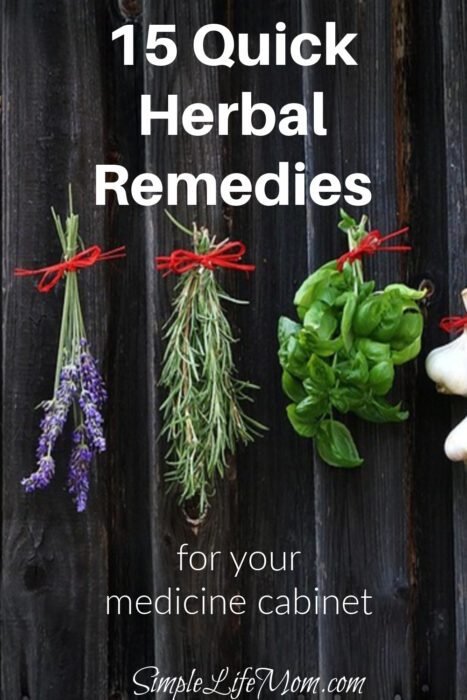
When I say herbal remedies aren’t a cure all for everything, I mean that herbs and essential oils are not a catch all for every person. In other words, what works for one person may not work for the next. This is because your body’s response to the stimulus is very important. Some people may find that one recipe “works” while the next doesn’t. For example, you may find that lavender and chamomile is relaxing and calming, but if you feel that they do nothing for you, then you may want to try vetiver. You need to find what works for your system and needs.
I hope you find the following recipes useful as you learn how to use essential oils and herbs and incorporate them into your medicinal cabinet.
Carrier Oils in Herbal Remedies
Carrier oils are used in recipes for essential oils. Though some essential oils work well applied neat (without dilution), they tend to evaporate before doing much. Adding a carrier oil will ensure that the essential oils have time to penetrate the skin.
I suggest you use olive oil, sweet almond oil, avocado oil, coconut oil, or apricot kernel oil. You can find high quality oils here.
Keeping Herbal Remedies Fresh
Keep all oils in a cool, dark place and sealed. This will slow the break down of the oils. If you open the bottle and smell a musty, old scent, then the oils are rancid and need to be replaced.
Essential oils will keep almost indefinitely if kept properly. Also keep them out of direct sunlight and heat.
When making herbal remedies with essential oils, put the carrier oil in a dropper bottle and add the essential oils. Keep sealed in a dark, cool location for 4-6 months.
Caution
Be aware that pets, especially cats, do not like to be around diffusing essential oils. Always give them a way to leave the area when you are diffusing oils.
Always test new essential oils on your wrist for allergic reactions. Place a drop of the diluted essential oil on your wrist and wait 15 minutes to see if there is any redness or irritation.
Allergic reactions can also occur after prolonged use. This is a sensitivity that builds up in the skin. Discontinue use immediately if rash, itchiness, or other adverse responses occur.
Use your judgement and don’t put off seeing a doctor if the situation gets worse. The remedies below are for ailments that are, in general, not serious, but sometimes things can escalate. Make sure to seek help if you need it.
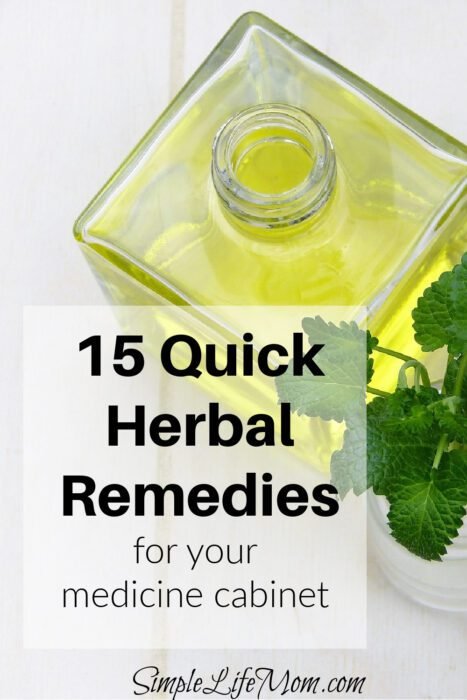
Skin
Rash/Stings
These options are used on skin rashes from allergic reactions or bee stings.
Option #1
Most places in America have narrow leaf and flat leaf plantain (not the banana like fruit). These “weeds” are amazing for rashes and bee stings. You will stop the pain from a bee sting immediately and calms rashes from nettle and other irritating plants. Simply pick a plantain leaf and chew it. Place the chewed leaf onto the effected area. If you don’t want to chew it first, crush it well between your fingers. If you don’t have any growing in your yard, you can get some here. It’s good to have in your cabinet throughout the year.
Option #2
- 1 tablespoon carrier oil (see above) or aloe vera liquid
- 5 drops lavender essential oil
- 5 drops chamomile essential oil
To Use: Apply to irritated area. Repeat as necessary
Tick Bites
Tick bites can carry tick fever or Lyme disease. As someone who has suffered from over 8 strains of Lyme disease for most of my life, I take this very seriously. Members of my family have had to take antibiotics once or twice in their lives, so it’s not something that I jump to take for everything. But Lyme disease concerns is one. If the tick has had more than 24 hours in the skin and there is redness, you may want to consider getting an antibiotic. Only when used within the first few days do they do anything. Otherwise, antibiotics are a waste of time.
If there is a black spot in the middle of the bite, then you quite possibly have bacteria of tick fever. Add oregano, tea tree, and clove essential oils to 1 tablespoon of carrier oil and apply twice daily. We’ve had to do this a few times. We live with farm animals and have to deal with a lot of ticks. This has worked wonderfully. Check for sensitivity before use. These are very strong essential oils.
Cuts/ Wounds
Once cuts are sealed, apply tea tree and frankincense essential oil. These will prevent any infection and work to reduce inflammation.
Other essential oils that increase blood flow for faster healing and calm and heal:
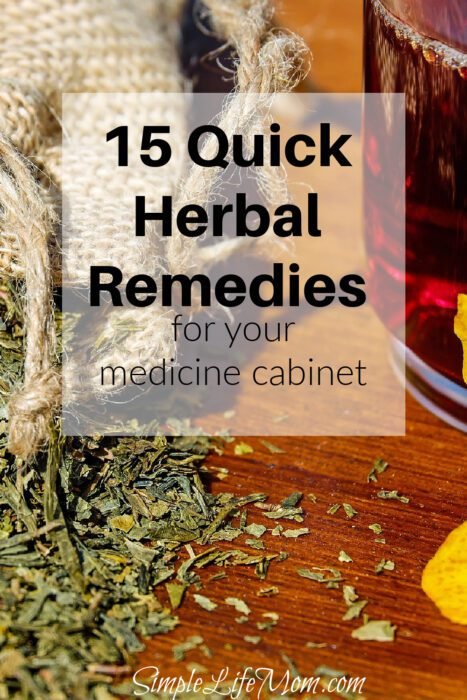
Allergies
Here are a list of essential oils that often help calm allergic responses. You can diffuse these in the home or dilute and apply to the chest to inhale.
- Lavender
- Peppermint
- Rosemary
- Chamomile
- Marjoram
- Chamomile (unless you have ragweed allergies)
- Lemon
- Clove
Add a few drops of 2-3 oils to a diffuser, or add them to 1 tablespoon of carrier oil and apply to wrists or chest.
You can also use these as fresh or dried herbs and make a tea. Here’s where you can get great herbs.
Common Ailments
Ear Infections
I use tea tree behind my ear whenever I feel a twinge of pain in my ear. Apply a drop directly to your neck at the base of the ear behind where an earring would be. There is an artery there that will absorb the oil and carry it deeper into the ear. I usually have to apply only once or twice. Always dilute and do a wrist test first when applying to children.
Other essential oils that can be used:
- Red thyme (this is a hot oil, it must be diluted and not used on children)
- Eucalyptus (do not use on very small children)
- Marjoram
- Lavender
Sore Throat
Option #1
Ground Cinnamon kills bacteria and deadens nerves making it a great choice to soothe sore throats. Put one teaspoon of cinnamon in a cup or small bowl. Add 1 tablespoon of raw honey and mix well. It should be thick but all incorporated. If you need to add a little more honey, then do so. Use a teaspoon to remove a little to eat. Do not eat or drink for 10 minutes. Let it coast and numb the throat.
Option #2
Mix and apply the following to the throat area:
- 1 tablespoon carrier oil
- 5 drops chamomile essential oil
- 1 drop red thyme essential oil
- 2 drops lemon essential oil
- 2 drops tea tree essential oil
Cold Sores
Option #1
The Lemon balm or Melissa plant is very easy to grow and the #1 go to for anyone who gets cold sores. Simply break off a leaf, chew it, and place it on the area when you first feel the tingling. This has been studied and shown to help as fast as and even better than pharmaceutical creams.
Option #2
Apply geranium neat to the sore. Dilute it with a carrier oil if it is irritating. Geranium is another herb that tends to stop the outbreak from getting worse and to speed healing.
Common Colds
Don’t diffuse hyssop and eucalyptus around very small children.
Option #1
Add to a diffuser:
- 1 drop hyssop essential oil
- 2 drops tea tree essential oil
- 2 drops lemon essential oil
- 2 drops Ravensara essential oil
Option #2
Add to a diffuser:
- 2 drops cinnamon essential oil (bark or leaf)
- 2 drops clove essential oil
- 1 drop oregano essential oil
- 2 drops eucalyptus essential oil
Toothache
Your ancestors probably chewed on cloves when they had a toothache. This is for good reason. Clove is antibacterial and creates a slight numbing effect. You can still do this today. Take one clove and chew slightly and leave on the side of your mouth near the pain.
Essential Oil blend for toothaches:
- 1 tablespoon carrier oil
- 1 drop clove essential oil
- 3 drops tea tree essential oil
- 3 drops peppermint essential oil
Apply a few drops to the jaw and neck area above the pain. Repeat 2x per day.
Stress/Anxiety
Essential oils can be very calming. Find what works for you by smelling various oils. Which ones make you happy or make you take a deep breath and relax? These are some of my favorite essential oil blends. Place them on your wrist, neck, leather bracelet, or diffuse in the home or workplace when applicable. I use one at a time, but you can combine a drop of one or two together if that’s what works for you.
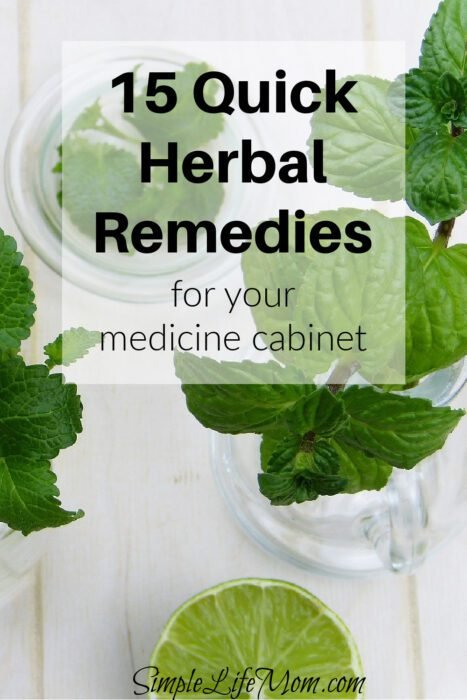
The Home
Essential oils to cleanse and freshen the air can be diffused in the home. Always leave options for pets to leave the area. Cats can be sensitive to diffused oils.
Other Herbal Remedies
For more herbal remedies, check out these articles:


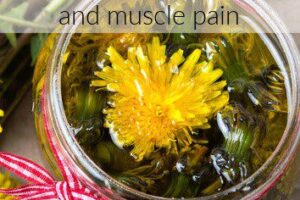



Leave a Reply
We'd love to hear your thoughts and ideas!